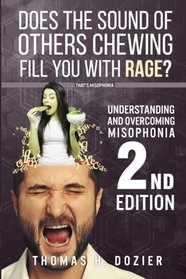Search -
Understanding and Overcoming Misophonia: A Conditioned Aversive Reflex Disorder
Understanding and Overcoming Misophonia A Conditioned Aversive Reflex Disorder
Author:
Is Misophonia Ruining Your Life? — The 2nd edition includes recent research of brain imaging studies and physical response studies of individuals when triggered. It includes over 50% new information compared to the first edition, including more management techniques, personal stories of individuals with misophonia and their families, treatment te... more »
Author:
Is Misophonia Ruining Your Life? — The 2nd edition includes recent research of brain imaging studies and physical response studies of individuals when triggered. It includes over 50% new information compared to the first edition, including more management techniques, personal stories of individuals with misophonia and their families, treatment te... more »
ISBN-13: 9781544754581
ISBN-10: 1544754582
Publication Date: 3/16/2017
Pages: 222
Edition: 2nd
Rating: 1
ISBN-10: 1544754582
Publication Date: 3/16/2017
Pages: 222
Edition: 2nd
Rating: 1
4 stars, based on 1 rating
Publisher: CreateSpace Independent Publishing Platform
Book Type: Paperback
Members Wishing: 1
Reviews: Amazon | Write a Review
Book Type: Paperback
Members Wishing: 1
Reviews: Amazon | Write a Review
Genres:
- Health, Fitness & Dieting >> Diseases & Physical Ailments >> Hearing Problems
- Health, Fitness & Dieting >> Diseases & Physical Ailments >> Nervous System
- Health, Fitness & Dieting >> Psychology & Counseling >> Applied Psychology
- Medical Books >> Medicine >> Internal Medicine >> Neurology
- Health, Fitness & Dieting >> Psychology & Counseling >> Clinical Psychology
- Medical Books >> Psychology >> Applied Psychology




